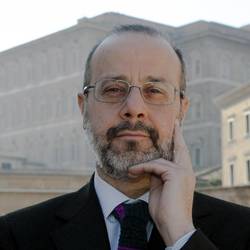Vian: “firmness and Transparency Are Needed to Clean up the Church”
By Giacomo Galeazzi
Professor, you are director of L’Osservatore Romano and a historian of Christianity. Does the Vatileaks scandal prove that Joseph Ratzinger is under attack? “Benedict XVI does not run away from problems; he faces them without fear. He is going through an uphill struggle at the moment. His image was distorted right from the start. The public presented him as a great German inquisitor, a panzerkardinal, a German shepherd. Then other hurdles sprang up along the way; for example, the misunderstanding of his lecture in Regensburg, the forgiveness he granted to Lefebvrian bishop Richard Williamson, the controversy over the use of condoms to prevent the spread of AIDS and the “perfect storm” created by the sex abuse scandal. The Pope showed his way of doing things in his handling of the Williamson case. He wrote a letter resembling that written by Saint Paul to the Galatians and managed to turn the situation around. He did not allow everything he had done to bring the Catholic Church closer to Judaism be ruined. He lamented that he was represented in a way that was far from the truth.” How did the Pope react to the confidential document leak? “When the Vatileaks scandal broke out, Benedict XVI did not deny the problem but deduced that the scandal was used to describe an unreal situation in an unclear way, when in actual fact, the vast majority of Vatican officials are loyal and pay honest service to the Pope and to the Holy See. A burst of pride, explained further by Angelo Becciu, Substitute of the Secretary of State. The Holy See chose a distinguished jurist, Cardinal Julian Herranz and two other highly prudent cardinals, Tomko and De Giorgi, to shed light on the document leak case. So the Holy See is treading carefully, respecting judicial procedures completely. Three cardinals who are over 80 and cannot take part in the next conclave are in charge of the investigations. They are therefore completely free before God and their conscience. They only answer to the Pope. What is the so-called “purification” process Benedict XVI has been working on? “It is a process of renewal in line with the history of Christianity. Joseph Ratzinger has often reiterated that the worst persecution the Church could undergo is sin within it. The Church’s biggest problem is not the attacks it receives from the outside but the human weaknesses which the people that work within it succumb to. This is why the Church is constantly in need of renewal. With historical and theological sharpness, Benedict XVI proclaims that the papacy’s strength lies solely in God’s grace. Hence the Pope re-evokes the scene of the conferral of the primacy on Peter, when Jesus announces the passion and asks Peter to follow him. The Church’s biggest problems derive from human weakness.” So there are no conspiracies against the Church? “There are definitely external attacks, but if we look back over the two thousand years of Christianity’s existence, today’s situation has undoubtedly improved, despite the fact that the Church often finds itself working in secularised and sometimes even de-Christianised societies; France coined the expression “de-Christianised” in the 700s and the French Revolution even tried to change Christianity’s timeline. Its attempts failed and if there is any trace left of the Revolutionary calendar, it is only because of Napoleon’s coup d’etat. Are there any media campaigns going on against the Church? “The Church and the press do not have the same outlook on things. More than media campaigns against the Church there are reciprocal misunderstandings between the Church and the media which both have problems engaging in dialogue. The impression is that for the mass media the Pope is only good when he’s dead. Karol Wojtyla came under harsh attacks for most of his pontificate. Paul VI was mourned for by men like Eugenio Scalfari who had openly criticised him.” In the Church an enemy of modernity? “Absolutely not. The Church distances itself from modernity when modernity turns into an uncritical religion and becomes irrational. Since the beginning of the modern age the Church has found itself battling against attempts to elevate reason to divinities that are averse to Christianity. In actual fact, the Christian tradition has sought the help of reason. Two good examples are Thomas Aquinas’ theological architecture and Dante’s poetic transposition of this in his Divine Comedy. The Church has never feared modernity itself, unless it becomes an antireligious system. And the Church has never been an enemy of true science, meaning science which does not become dogmatic processing.”
|
.
Any original material on these pages is copyright © BishopAccountability.org 2004. Reproduce freely with attribution.
